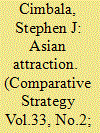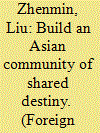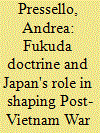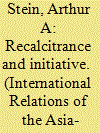|
|
|
Sort Order |
|
|
|
Items / Page
|
|
|
|
|
|
|
| Srl | Item |
| 1 |
ID:
132005


|
|
|
|
|
| Publication |
2014.
|
| Summary/Abstract |
The United States' military-strategic pivot toward Asia is motived by concerns about a rising China, about the increased significance of Asia on the world economic and political stages, and about the growing risks of nuclear proliferation and nuclear first use in that region. Nuclear Asia already numbers five acknowledged or de facto nuclear weapons states among its members: Russia, China, North Korea, India, and Pakistan. Failure to reverse North Korea's nuclear weapons status or political distrust among other powers may increase the number of Asian nuclear weapons states (including states with prospective nuclear-missile reach into Asia) to eight, creating an Asian-Middle Eastern nuclear arms race that defies containment. On the other hand, an alternative presents itself, in the form of a multilateral nuclear arms reduction agreement that would create three tiers of accepted nuclear weapons states and bar the door to new admits.
|
|
|
|
|
|
|
|
|
|
|
|
|
|
|
|
| 2 |
ID:
131389


|
|
|
|
|
| Publication |
2014.
|
| Summary/Abstract |
Under what conditions do regional security organizations (RSOs) take up a broader agenda or scope in security governance? Further, does broader scope matter for regional security? These questions are addressed using a quantitative comparative analysis of 25 RSOs over the period 1990-2009. Similarity among members in their capacities and political systems are identified as two central conditions for increased scope. In contrast, hegemony is not a significant factor. Institutionalization also seems to matter: RSOs that have been around longer and encompass more members are more successful in expanding their security agenda. There is only weak empirical support for the idea that RSOs with a broader scope have a stronger pacifying effect on regional security. The implications of these findings are discussed in greater detail for Asian RSOs, which have only limited scope and operate in comparatively high levels of insecurity. However, except from the legacy of conflict, variables identified in the general models apply similarly to Asia.
|
|
|
|
|
|
|
|
|
|
|
|
|
|
|
|
| 3 |
ID:
128315


|
|
|
|
|
| Publication |
2013.
|
| Summary/Abstract |
As a member of Asia, China's development is rooted in Asia, and Asia has always been a priority on China's diplomatic agenda. China's growth has benefited from a peaceful neighboring area and, in turn, promoted stability and prosperity in Asia. At the same time, China and its neighbors are faced with both historic opportunities and challenges in development. Since the new government in China took office in 2013, China and other Asian countries have had frequent high-level exchanges and stronger cooperation in the field of economy and trade. China actively upholds peace and stability in the region and is working with other Asian countries to build a bright future for an Asian community of shared destiny.
|
|
|
|
|
|
|
|
|
|
|
|
|
|
|
|
| 4 |
ID:
131333


|
|
|
|
|
| Publication |
2014.
|
| Summary/Abstract |
Japan's postwar contribution to international political affairs is often described as limited, primarily due to Japan's focus on reconstructing and expanding its economy. However, this article argues that since the 1970s, Japan has played an active role in shaping the post-Vietnam War order in Southeast Asia. The Japanese actively sought to address the regional power vacuum that had been left by the diminished American presence and the Sino-Soviet attempts to fill it. To do so, in 1977, Japanese Prime Minister Fukuda Takeo announced a foreign policy initiative, the so-called Fukuda Doctrine. One of its pillars was Japan's commitment to promoting coexistence and cooperation among ASEAN nations and their communist Indochinese neighbors. Based on declassified documents and other primary sources, this study demonstrates the strategic nature of the Fukuda Doctrine and sheds light on its political, geopolitical, and security objectives. This includes the realization of a Southeast Asian order in which Japan could maintain a position of influence and, through it, enhance its international political role. The strategic implications of this approach explain why Japan continued to pursue the doctrine despite increased regional and global tension following the 1979 outbreak of the Cambodian conflict and renewed Cold War tensions in the early 1980s.
|
|
|
|
|
|
|
|
|
|
|
|
|
|
|
|
| 5 |
ID:
131998


|
|
|
|
|
| Publication |
2014.
|
| Summary/Abstract |
Rising powers have attracted tremendous interest in international politics and theory. Yet the ways in which secondary powers strategically respond to regional changes in the distribution of power have been largely neglected. This article seeks to fill this gap by presenting a systematic comparative analysis of the different types and causes of contestation strategies undertaken by secondary powers. Empirically, it focuses on two contentious regional dyads in East and South Asia, exploring how structural, behavioral, and historical factors shape the way in which Japan and Pakistan respond, respectively, to China's and India's regional power politics. The article concludes that the explanatory power of these factors depends on the respective secondary power's particular context: in the case of Japan, China's increasingly assertive regional behavior combined with a nontransparent military buildup has invoked the most significant strategic shifts, while in the case of Pakistani contestation, an increasing threat perception in the late 1980s led to the return to a pre-1971 revisionist agenda, whereas the overt nuclearization in the late 1990s mitigated India's growing conventional superiority and enabled Islamabad to replace soft balancing with more direct means of hard balancing.
|
|
|
|
|
|
|
|
|
|
|
|
|
|
|
|
| 6 |
ID:
105312


|
|
|
|
|
| Publication |
2011.
|
| Summary/Abstract |
This article explores the role of Japan in post-war Asia to endeavor to present a more accurate picture than the one-dimensional portrayal of Japan as an exclusively economic presence. By taking three viewpoints into consideration, the author attempts to provide a picture of international politics in post-war Asia as an integrated whole.
|
|
|
|
|
|
|
|
|
|
|
|
|
|
|
|
| 7 |
ID:
131390


|
|
|
|
|
| Publication |
2014.
|
| Summary/Abstract |
This paper challenges the conventional wisdom that US power and preferences following World War II led to bilateralism in Asia and multilateralism in Western Europe. It argues that the challenges facing the United States in both regions were similar, as were US policies meant to address them. With some lag, the United States supported the economic recovery of the regional powers it had defeated (Germany and Japan), saw the restoration of regional trade as a prerequisite, sought military bases to assure postwar security, and envisioned rearming its former foes as part of its security strategy. The outcomes in the two regions reflected the preferences and reservations of regional actors. The critical differences between the regions were structural. The existence of middle powers was critical in Europe, the return of colonial powers to Asia precluded regional arrangements in the short term, and geostrategic differences shaped the requisites for regional security.
|
|
|
|
|
|
|
|
|
|
|
|
|
|
|
|
| 8 |
ID:
105311


|
|
|
|
|
| Publication |
2011.
|
| Summary/Abstract |
This article examines the "Arc of Freedom and Prosperity" which symbolizes a new direction of Japanese diplomacy and reinforced cooperation with countries where such ideals as democracy, freedom, and human rights are shared. Originally proposed by Foreign Minister Taro Aso, the concept has since moved into the background but nevertheless remains in the thoughts of current Japanese diplomatic strategy.
|
|
|
|
|
|
|
|
|
|
|
|
|
|
|
|
|
|
|
|
|